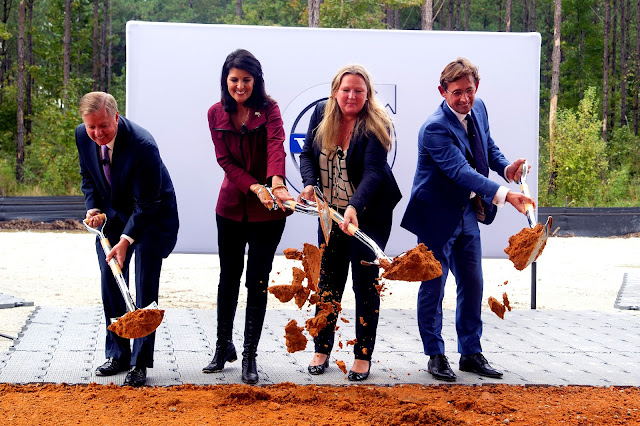Volvo Cars has taken the first steps in building its all-new car manufacturing facility in Berkeley County, South Carolina. The new plant will initially produce the next-generation Volvo S60 sedan, based on Volvo Cars’ new Scalable Product Architecture (SPA). The company is investing USD500m in the new facility which initially will have a capacity of up to 100,000 cars per year.
The groundbreaking event in South Carolina today was attended by Lex Kerssemakers, Senior Vice President Americas at Volvo Cars and Nikki Haley, Governor of South Carolina, along with other key public officials.
“Volvo Cars’ new South Carolina plant is a reflection of our firm commitment to the US market,” said Lex Kerssemakers. “The United States is a cornerstone in Volvo Cars’ global expansion plan and together with a whole range of new cars in the coming years, this new plant will play a vital role in growing our presence in the United States.”
The SPA-based Volvo S60 Sedan is currently under development at Volvo Car Group headquarters in Gothenburg, Sweden. American built S60s will be sold in the US market as well as overseas through exports from the Port of Charleston, along with another model yet to be determined. The first South Carolina-built Volvos are expected to roll off the assembly line in late 2018.
The decision to choose Berkeley County was taken as a result of its easy access to international ports and infrastructure, a well-trained labour force, an attractive investment environment and experience in the high tech manufacturing sector. Volvo Cars estimates that the factory will employ up to 2,000 people over the next decade and up to 4,000 people in the longer term.
With the new US plant in place, Volvo Cars will be able to manufacture cars on three continents, underscoring its position as a truly global car maker. It already operates two car plants in Europe and two in China.
VOLVO DÉBUTE LA CONSTRUCTION DE SON USINE EN CAROLINE DU SUD
Volvo Cars a entamé la construction de sa toute nouvelle usine située dans le Comté de Berkeley en Caroline du Sud. Elle fabriquera dans un premier temps la berline S60 dernière génération basée sur la nouvelle architecture produit évolutive Scalable Product Architecture (SPA). La société a investi 500 millions de dollars dans cette nouvelle usine dont la production initiale s’établira à environ 100 000 véhicules par an.
Accompagnés de plusieurs officiels, Lex Kerssemakers, Vice-président senior Amérique chez Volvo Cars, et Nikki Haley, Gouverneur de Caroline de Sud, ont assisté ensemble à ce grand événement.
« Cette nouvelle usine en Caroline du Sud reflète notre solide engagement sur le marché américain », a expliqué Lex Kerssemakers. « Les États-Unis sont un des piliers de notre stratégie d’expansion, et avec l’arrivée d’une toute nouvelle gamme de véhicules dans les prochaines années, cette usine jouera un rôle central afin d’accroître notre présence sur le sol américain ».
La Volvo S60 berline nouvelle génération est actuellement en cours de développement à Göteborg, siège social de Volvo Car Group, en Suède. Les S60 fabriquées aux États-Unis, ainsi qu’un autre modèle encore à déterminer, seront vendues sur le marché américain et exportées outre-mer depuis le port de Charleston. Les premières unités construites en Caroline du Sud à sortir de la ligne de production sont attendues d’ici 2018.
Le choix s’est porté sur le Comté de Berkeley qui dispose d’un accès facile aux ports et autres infrastructures internationales, d’une main-d’œuvre qualifiée, d’un environnement propice aux investissements, et d’une large expérience dans le secteur de la fabrication de produits high tech. Volvo Cars estime que l’usine emploiera 2 000 personnes au cours de la prochaine décennie et jusqu’à 4 000 sur le long terme.
Une fois l’usine achevée, Volvo sera en mesure de produire des véhicules sur trois continents, confirmant sa position de constructeur à l’échelle mondiale. Deux usines en Europe et deux en Chine sont déjà en activité.







Commentaires
Enregistrer un commentaire